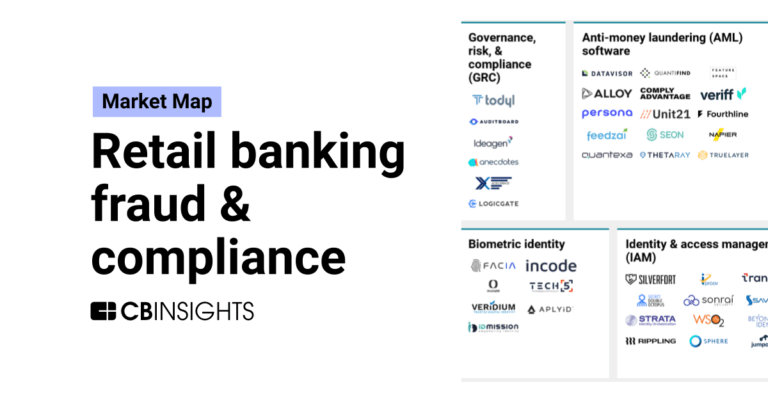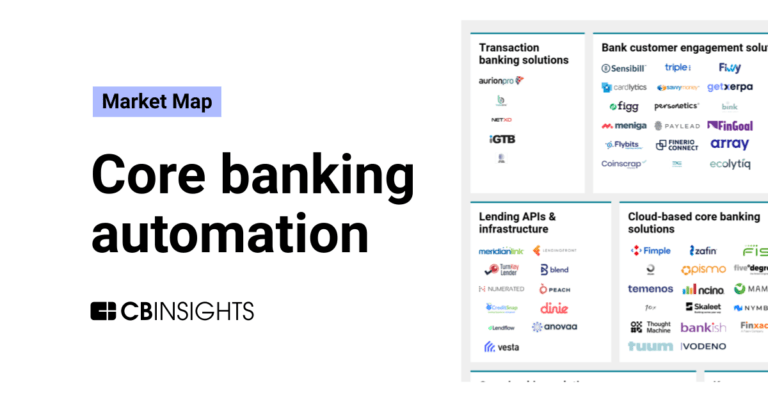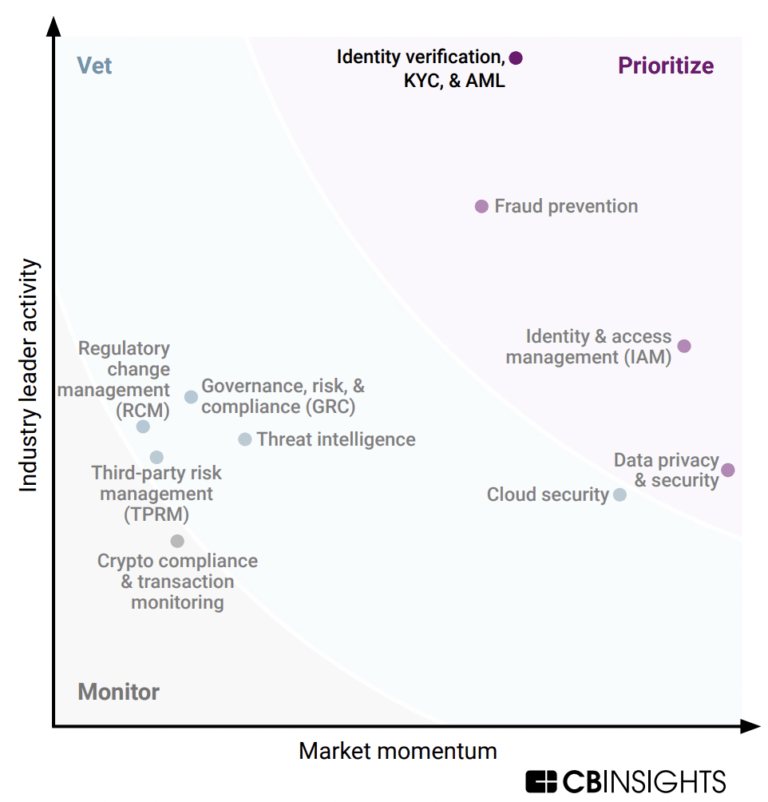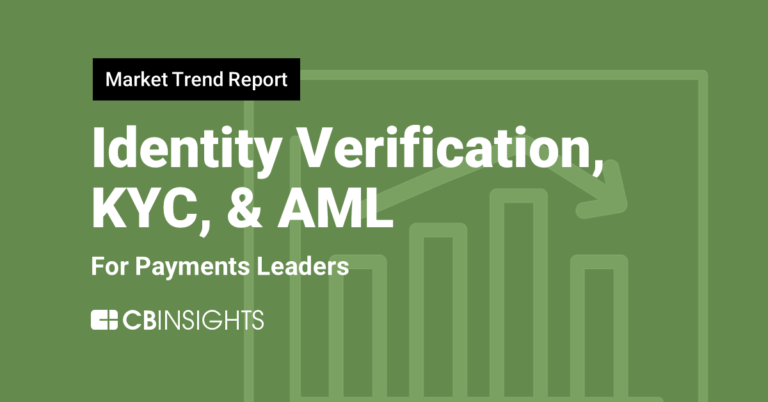
Alloy
Founded Year
2015Stage
Series C - II | AliveTotal Raised
$208.92MValuation
$0000Last Raised
$52M | 2 yrs agoMosaic Score The Mosaic Score is an algorithm that measures the overall financial health and market potential of private companies.
-18 points in the past 30 days
About Alloy
Alloy is a company focused on identity risk management within the financial services sector. Its main offerings include automated solutions for fraud prevention, compliance, credit underwriting, and identity verification to support the entire customer lifecycle. Alloy primarily serves banks, credit unions, and fintech companies. It was founded in 2015 and is based in New York, New York.
Loading...
ESPs containing Alloy
The ESP matrix leverages data and analyst insight to identify and rank leading companies in a given technology landscape.
The payments fraud detection & prevention market offers a range of technologies helping businesses detect and block anomalous payment activity. Vendors in this market cater to many different industries, from financial services to e-commerce. These solutions cover a range of different types of financial fraud like chargebacks, ACH, wire, and credit card fraud.
Alloy named as Outperformer among 15 other companies, including Mastercard, Oracle, and Fiserv.
Alloy's Products & Differentiators
Licensing fees
Licensing fees for products or use cases purchased
Loading...
Research containing Alloy
Get data-driven expert analysis from the CB Insights Intelligence Unit.
CB Insights Intelligence Analysts have mentioned Alloy in 6 CB Insights research briefs, most recently on Mar 14, 2024.

Mar 14, 2024
The retail banking fraud & compliance market map
Jan 4, 2024
The core banking automation market mapExpert Collections containing Alloy
Expert Collections are analyst-curated lists that highlight the companies you need to know in the most important technology spaces.
Alloy is included in 7 Expert Collections, including Unicorns- Billion Dollar Startups.
Unicorns- Billion Dollar Startups
1,244 items
Regtech
1,921 items
Technology that addresses regulatory challenges and facilitates the delivery of compliance requirements. Regulatory technology helps companies and regulators address challenges ranging from compliance (e.g. AML/KYC) automation and improved risk management.
Digital Lending
2,468 items
This collection contains companies that provide alternative means for obtaining a loan for personal or business use and companies that provide software to lenders for the application, underwriting, funding or loan collection process.
Fintech
9,296 items
Companies and startups in this collection provide technology to streamline, improve, and transform financial services, products, and operations for individuals and businesses.
Fintech 100
849 items
250 of the most promising private companies applying a mix of software and technology to transform the financial services industry.
Digital ID In Fintech
268 items
For this analysis, we looked at digital ID companies working in or with near-term potential to work in fintech applications. Startups here are enabling fintech companies to verify government documents, authenticate with biometrics, and combat fraudulent logins.
Latest Alloy News
Aug 23, 2024
By Gloria Methri Alloy Share In Alloy’s recently released 2024 State of Embedded Finance Report , a striking 80% of U.S.-based sponsor banks reported facing challenges in meeting embedded finance compliance requirements. Despite this, embedded finance programs are driving substantial revenue for these institutions, accounting for over 50% of their income. This survey, which gathered insights from more than 50 decision-makers, underscores the critical yet complex role of compliance in the growing field of embedded finance. The Embedded Finance Report comes at a time when sponsor banks in the U.S. face drastically increased regulatory scrutiny. According to data from Klaros Group, 25.6% of the FDIC’s formal enforcement actions have been directed at sponsor banks since the beginning of 2024. “Running a sponsor bank program is inherently complex because you have banks who are highly regulated working with companies that are often new, fast-growing, and creating entirely new ways for consumers to interact with money,” said Tommy Nicholas, CEO and co-founder of Alloy. “Despite the challenge, we are already seeing sponsor banks respond to regulatory developments by investing in better controls, training, and adding to their compliance tech stack.” These recent compliance violations have resulted in financial consequences for sponsor banks: 75% have lost $100k or more due to compliance violations, while 39% reported losses of $250K and 6% lost $1M or more. However, financial losses are far from the worst consequence of regulatory violations: decision-makers at sponsor banks rank reputational damage as the top consequence of mishandling FinTech partners’ compliance. Alloy’s report found that sponsor banks’ top barriers to maintaining a compliant embedded finance program are 1) a lack of control over their FinTech partners’ policy controls and 2) a lack of auditability of their FinTech partners’ policy controls. Earlier this year, the company launched Alloy for Embedded Finance, a product that allows sponsor banks, electronic money institutions, and program managers in the U.S., U.K., and E.U. to oversee the compliance policies of their FinTech partners. This addresses embedded finance providers’ need to have greater control and visibility into their FinTech partners’ compliance programs. Today, Alloy also announced a new module within the product, Audit Access. Tools like Alloy for Embedded Finance are becoming more widely adopted by sponsor banks. The report found that sponsor banks’ most likely course of action in response to regulatory scrutiny is investing in new compliance technology. “Using Alloy for Embedded Finance has been a game changer for our team,” said Teddy Gordon, Director of Data at Grasshopper Bank. “We can easily set KYC requirements for our fintech partners and then roll those policies out to our entire program all at once. We ensure we’re compliant across the board, and our fintech partners still get to manage their risk tolerance.” The report was fielded from May 30th to June 5th, 2024, and includes respondents from sponsor banks in the U.S. with at least $2 billion in assets under management (AUM). Previous Article
Alloy Frequently Asked Questions (FAQ)
When was Alloy founded?
Alloy was founded in 2015.
Where is Alloy's headquarters?
Alloy's headquarters is located at 41 Elizabeth Street, New York.
What is Alloy's latest funding round?
Alloy's latest funding round is Series C - II.
How much did Alloy raise?
Alloy raised a total of $208.92M.
Who are the investors of Alloy?
Investors of Alloy include Bessemer Venture Partners, Avid Ventures, Felicis, Canapi, Lightspeed Venture Partners and 16 more.
Who are Alloy's competitors?
Competitors of Alloy include Lendflow, AIO, Spec, Bits Technology, Effectiv and 7 more.
What products does Alloy offer?
Alloy's products include Licensing fees and 3 more.
Who are Alloy's customers?
Customers of Alloy include Mountain America Credit Union, Live Oak Bank, Suncoast Credit Union, Ramp and Stash.
Loading...
Compare Alloy to Competitors

Socure focuses on digital identity verification and fraud prediction, operating within the technology and financial services sectors. The company offers a platform that uses artificial intelligence (AI) and machine learning (ML) to verify identities in real-time, analyzing various elements such as email, phone, address, and device risk. This service is primarily used by industries such as financial services, government, gaming, healthcare, telecom, and e-commerce. It was founded in 2012 and is based in Incline Village, Nevada.

Sumsub is a company that focuses on online identity verification and orchestration services, operating in the technology and security sectors. The company offers a platform that allows businesses to verify users, businesses, and transactions, manage cases, and deter fraud, all from a single dashboard. Sumsub primarily serves sectors such as fintech, online gaming, and trading. It was founded in 2015 and is based in London, England.

Unit21 operates as a detection and investigations platform for anti-money laundering. It helps protect businesses against adversaries through a simple application programming interface (API) and dashboard for detecting and managing money laundering, fraud, and other sophisticated risks across multiple industries. The company was founded in 2018 and is based in San Francisco, California.

Persona specializes in identity management solutions. It focuses on the automation of Know Your Customer (KYC) and Know Your Business (KYB) programs and fraud prevention. It offers services that automate identity-related use cases, including the secure collection and verification of personal information, government identity documents (IDs), and user selfies, as well as providing tools for case review and orchestration to streamline identity operations. It serves businesses that need to comply with strict identity verification regulations, such as those in the online education and financial sectors. It was founded in 2018 and is based in San Francisco, California.

Ondato is a technology company specializing in KYC and AML compliance solutions within the identity verification industry. The company offers a suite of services including identity and business onboarding, customer data management, transaction monitoring, due diligence, and various authentication methods, all designed to streamline compliance processes and enhance security for businesses. Ondato's solutions cater to a diverse range of sectors such as financial services, insurance, telecommunications, and more. It was founded in 2018 and is based in London, England.

Prove Identity operates as a digital identity authentication platform. It offers phone-centric solutions to enable businesses to verify customers while thwarting fraud and cyberattacks. Prove Identity was formerly known as Payfone. The company was founded in 2008 and is based in New York, New York.
Loading...



